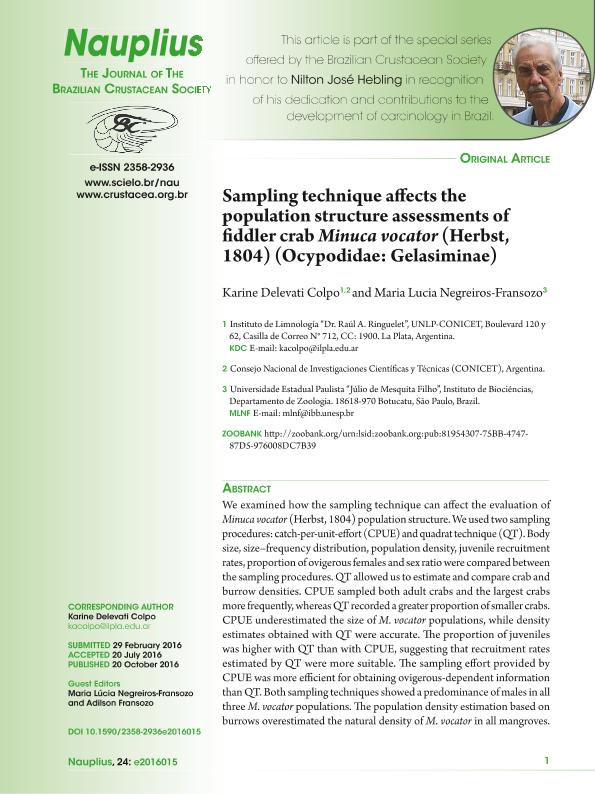Mostrar el registro sencillo del ítem
dc.contributor.author
Delevati Colpo, Karine

dc.contributor.author
Negreiros Fransozo, María Lucía

dc.date.available
2017-09-01T14:31:43Z
dc.date.issued
2016-07
dc.identifier.citation
Delevati Colpo, Karine; Negreiros Fransozo, María Lucía; Sampling technique affects the population structure assessments of fiddler crab Minuca vocator (Herbst, 1804) (Ocypodidae: Gelasiminae); Sociedade Brasileira de Carcinologia; Nauplius; 24; 7-2016; 1-11
dc.identifier.issn
0104-6497
dc.identifier.uri
http://hdl.handle.net/11336/23437
dc.description.abstract
We examined how the sampling technique can affect the evaluation of Minuca vocator (Herbst, 1804) population structure. We used two sampling procedures: catch-per-unit-effort (CPUE) and quadrat technique (QT). Body size, size?frequency distribution, population density, juvenile recruitment rates, proportion of ovigerous females and sex ratio were compared between the sampling procedures. QT allowed us to estimate and compare crab and burrow densities. CPUE sampled both adult crabs and the largest crabs more frequently, whereas QT recorded a greater proportion of smaller crabs. CPUE underestimated the size of M. vocator populations, while density estimates obtained with QT were accurate. The proportion of juveniles was higher with QT than with CPUE, suggesting that recruitment rates estimated by QT were more suitable. The sampling effort provided by CPUE was more efficient for obtaining ovigerous-dependent information than QT. Both sampling techniques showed a predominance of males in all three M. vocator populations. The population density estimation based on burrows overestimated the natural density of M. vocator in all mangroves. Our results suggest that neither CPUE nor QT individually were accurate sampling techniques, but together provided reliable assessments of fiddler crab populations.
dc.format
application/pdf
dc.language.iso
eng
dc.publisher
Sociedade Brasileira de Carcinologia
dc.rights
info:eu-repo/semantics/openAccess
dc.rights.uri
https://creativecommons.org/licenses/by-nc-sa/2.5/ar/
dc.subject
Body Size
dc.subject
Catch-Per-Unit-Effort
dc.subject
Quadrat
dc.subject
Recruitment
dc.subject
Sex-Ratio
dc.subject.classification
Bioquímica y Biología Molecular

dc.subject.classification
Ciencias Biológicas

dc.subject.classification
CIENCIAS NATURALES Y EXACTAS

dc.title
Sampling technique affects the population structure assessments of fiddler crab Minuca vocator (Herbst, 1804) (Ocypodidae: Gelasiminae)
dc.type
info:eu-repo/semantics/article
dc.type
info:ar-repo/semantics/artículo
dc.type
info:eu-repo/semantics/publishedVersion
dc.date.updated
2017-08-15T14:27:37Z
dc.journal.volume
24
dc.journal.pagination
1-11
dc.journal.pais
Brasil

dc.description.fil
Fil: Delevati Colpo, Karine. Consejo Nacional de Investigaciones Científicas y Técnicas. Centro Científico Tecnológico Conicet - La Plata. Instituto de Limnología "Dr. Raúl A. Ringuelet". Universidad Nacional de La Plata. Facultad de Ciencias Naturales y Museo. Instituto de Limnología; Argentina
dc.description.fil
Fil: Negreiros Fransozo, María Lucía. Universidade Estadual Paulista Julio de Mesquita Filho; Brasil
dc.journal.title
Nauplius

dc.relation.alternativeid
info:eu-repo/semantics/altIdentifier/doi/http://dx.doi.org/10.1590/2358-2936e2016015
dc.relation.alternativeid
info:eu-repo/semantics/altIdentifier/url/http://ref.scielo.org/jrd5qg
Archivos asociados
